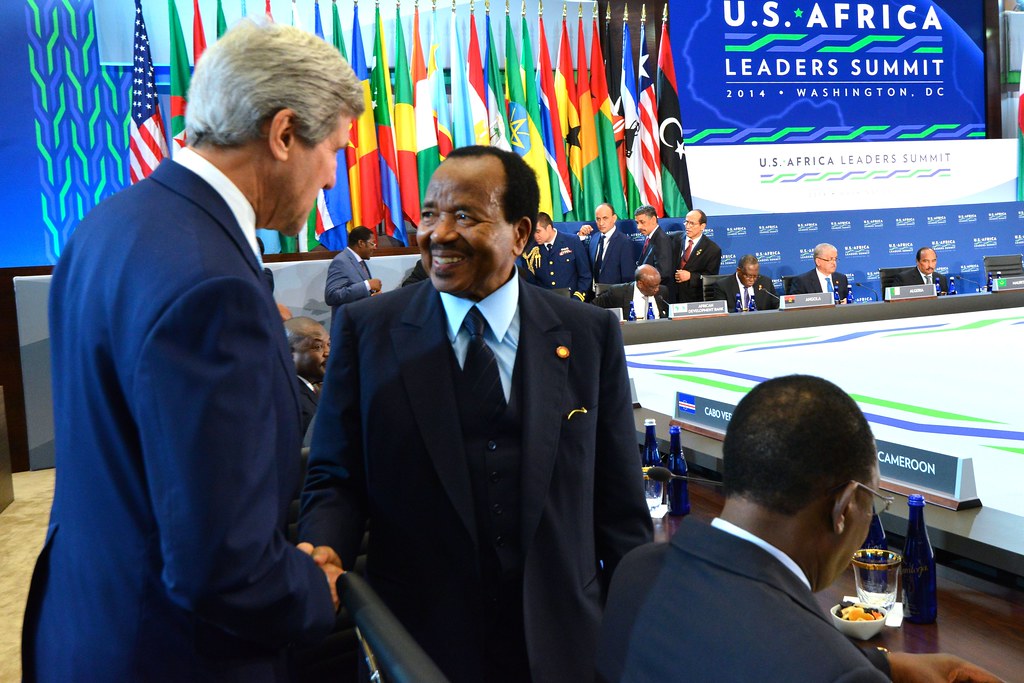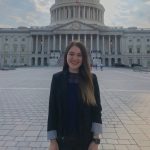The Republic of Cameroon, originally named Kamerun, is located in West Africa. The current President is Paul Biya, who is also one of only two presidents that Cameroon has had and the longest-serving leader in Africa, for over thirty years. Biya started his political career at the age of 43, as Cameroon’s Prime Minister under Ahmadou Ahidjo in 1975, becoming his successor in 1982. Because of his presidential ability, Biya modified the Cameroonian Constitution to allow presidents to serve for more than two terms and to be eligible for re-election every seven years.1 Even though Biya’s previous presidential elections ran smoothly, as 2016 arrived, Biya knew he would be faced with a formidable opponent, the Southern Cameroons National Council (SCNC).
In 1955, Kamerun gained independence from France and Great Britain. Then, in 1961, Ahmadou Ahidjo was elected President and renamed the country to the Federal Republic of Cameroon. Five years later, Ahidjo banned all political parties to avoid the lobbying of ethnic groups that were seen as a threat to national unity, including English-speaking communities.2 Nonetheless, in 1972, Cameroon created a new constitution that declared French as the language of the Eastern state and English as the language of the Western state, although English actually dominated Cameroonian commerce, technology, education, and politics.3 Yet, French officials saw this constitutional provision as a threat, and used French as the administration’s language of preference.4
After twenty-two years of ruling Cameroon, Ahidjo was pressured to resign by the French socialist government.5 His successor was his former prime minister, Paul Biya.6 Biya continued under Ahidjo’s party, Cameroonian National Union (CNU). Shortly after, former president Ahidjo regretted his decision in assigning Biya as his successor and attempted to overthrow him through a coup.7 For this reason, Ahidjo fled into exile in 1983 for attempting to conspire against the government. Absent from his trial, he was found guilty and sentenced to death.8 Biya then renamed Cameroon to the Republic of Cameroon and created the Cameroonians People’s Democratic Movement (CPDM) party, which later won the majority of the seats in parliament, thereby turning Cameroon into the most corrupt country in the world, according to Transparency International.
In December 1990, President Biya legalized the creation of a multiparty system to prove his party’s legitimacy. This introduced the union of parties with a connection to specific ethnic groups or provinces.9 When the first elections were held, Biya’s party won less than fifty percent of the seats, whereas the new parties won over sixty-eight percent of the seats. Biya knew he would have a problem if he did not join forces with the newly elected ruling party, so he did.10
With the establishment of a multiparty system, the anglophone regions organized a meeting in 1993 to promote a return to federalism, known as the All Anglophone Conference (AAC). However, the proposal was rejected twice by the Consultative Committee for Review of the Constitution. This did not stop the anglophone community as they created a council to encourage the two-state federation known as the Southern Cameroons National Council (SCNC). The SNCS members continued to hold protests in the anglophone provinces every October 1, advocating for their independence, calling it the Republic of Ambazonia.11

As an attempt to fix this problem, Biya modified the constitution in 2008, in agreement to establish English and French as the official languages, so they could both share equal status.12 However, in 2016 the French-speaking government imposed the use of French language in schools and courts in anglophone parts of Cameroon.13 In opposition to this, English-speaking teachers and lawyers protested against the employment of French-speaking educators and officials, who did not speak English and had no prior knowledge over the judicial courts. This alteration became known as the “anglophone crisis.”14 Anglophones argued that their minority rights were being violated and felt their judicial, educational, and local government systems should be protected. Both, anglophone lawyers and teachers formed the Cameroon Anglophone Civil Society Consortium (CASCSC). Meanwhile, Biya and his French-administered government were calling the anglophone activists “separatists.”15

In October 2017, the anglophone separatist leader, Julius Tabe, declared the independence of the Republic of Ambazonia. With elections less than a year away, Biya knew he had to do something about this. He was not going to let any “separatist” seize the country he has been leading for thirty-five years. Biya responded to this act by shutting down the internet for three months, banning the CACSC and SCNC, and incarcerating several leaders of these movements.16 This instigated violent protests in major cities in Northwest and Southwest Cameroon, leaving many dead and injured.17 The violence caused over 30,000 Cameroonians to flee their homes into the neighboring country, Nigeria.18 During 2017, several businesses, government buildings, automobiles, and schools had been set on fire in the anglophone regions by, both, the anglophones and francophones. As a result, schools were shut down for over a year, leaving hundreds of children without an education. Additionally, because of the protests by the anglophone community, Biya made several policies, such as the banning of any crowds with more than four people, imposing curfews, and deploying military forces into anglophone regions of Cameroon seeking to kill any “separatists” that may be a threat to the country.19

Biya was not going to let an opposing party diminish his chances of reelection, much less would he let them destroy the country he had built for over thirty years. According to an International Crisis Group, one of Cameroon’s Supreme Court justices was arrested for funding an anglophone campaign in 2017, and since then has been imprisoned. Because of these occurrences and the violence between both groups, anglophone communities were left in fear and without shelter, food, water, or healthcare. Throughout this time, Biya denied the existence of an “anglophone crisis.” Instead, the ruling party, Cameroon People’s Democratic Movement (CPDM), organized the first celebration of Cameroon’s reunification in support of the Republic of Cameroon and President Biya.20
Biya frightened thousands of individuals that only half of the country’s eligible voters partook in the presidential election and in October 2018, Paul Biya won his seventh presidential term. The opposition party called for a re-run of the presidential election in 2018 but was denied by the Constitutional Council, leaving the inhabitants of Cameroon in desperation for reform and an end to the language division. Today, President Biya has shown no signs of a compromise; instead, he continues to send military troops to kill or arrest those who appear a threat to the Republic of Cameroon.
International organizations, including the United Nations, European Union, and African Union have urged the anglophone and francophone parties to abstain from violence. and to preferably engage in a dialogue to reach an agreement that compliments both parties. However, Biya claims it has attempted numerous methods to deal with the anglophone community.21 Up to the present moment, Biya does not have a successor to follow his presidency, leaving critics to believe that the only way for Cameroon to prosper is to have a change of president. For now, Biya does not plan on letting anyone get in his way.
- Constitute, “Cameroon’s Constitution of 1972 with Amendments through 2008 PDF file,” Constitute Project, August 12, 2019, https://www.constituteproject.org/constitution/Cameroon_2008.pdf?lang=en. ↵
- “Cameroon’s Worsening Anglophone Crisis Calls for Strong Measures,” International Crisis Group, July 12, 2018, https://www.crisisgroup.org/africa/central-africa/cameroon/130-cameroon-worsening-anglophone-crisis-calls-strong-measures. ↵
- Carlous Muluh Nkwetisama, “Rethinking and reconfiguring English language education: Averting linguistic genocide in Cameroon,” International Journal of Applied Linguistics and English Literature 6, no. 6 (2017): 106. ↵
- Bernard Fonlon, “The language problem in Cameroon. (An historical perspective),” Comparative Education 5, no. 1 (1969): 38. ↵
- Tangie Nsoh Fonchingong, “Multipartyism and democratization in Cameroon,” Journal of Third World Studies 15, no. 2 (1998): 122. ↵
- BBC, “Cameroon profile – Timeline,” BBC News, October 22, 2018, https://www.bbc.com/news/world-africa-13148483. ↵
- Paul Lewis, “Cameroon Radio Says An Attempted Coup Has Failed,” The New York Times, April 7, 1984, https://www.nytimes.com/1984/04/07/world/cameroon-radio-says-an-attempted-coup-has-failed.html. ↵
- Glenn Fowler, “Ahmadou Ahidjo of Cameroon Dies; Ex-Leader was 65,” The New York Times, December 2, 1989, https://www.nytimes.com/1989/12/02/obituaries/ahmadou-ahidjo-of-cameroon-dies-ex-leader-was-65.html. ↵
- Tangie Nsoh Fonchingong, “Multipartyism and democratization in Cameroon,” Journal of Third World Studies 15, no. 2 (1998): 120. ↵
- The Commonwealth, “Cameroon: Constitution and politics,” Accessed 2020, https://thecommonwealth.org/our-member-countries/cameroon/constitution-politics. ↵
- “Cameroon’s Worsening Anglophone Crisis Calls for Strong Measures,” International Crisis Group, July 12, 2018, https://www.crisisgroup.org/africa/central-africa/cameroon/130-cameroon-worsening-anglophone-crisis-calls-strong-measures. ↵
- The Commonwealth, “Cameroon: Constitution and politics,” Accessed 2020, https://thecommonwealth.org/our-member-countries/cameroon/constitution-politics. ↵
- Siobhan O’Grady, “Divided by Language,” The Washington Post, February 5, 2019, https://www.washingtonpost.com/graphics/2019/world/cameroon-anglophone-crisis/. ↵
- BBC, “Cameroon profile – Timeline,” BBC News, October 22, 2018, https://www.bbc.com/news/world-africa-13148483. ↵
- Siobhan O’Grady, “Divided by Language,” The Washington Post, February 5, 2019, https://www.washingtonpost.com/graphics/2019/world/cameroon-anglophone-crisis/. ↵
- Nna-Emerka Okereke, “Analysing Cameroon’s Anglophone Crisis,” Counter Terrorist Trends and Analyses 10, no. 3 (2018): 9. ↵
- “Cameroon’s Worsening Anglophone Crisis Calls for Strong Measures,” International Crisis Group, July 12, 2018, https://www.crisisgroup.org/africa/central-africa/cameroon/130-cameroon-worsening-anglophone-crisis-calls-strong-measures. ↵
- Siobhan O’Grady, “Divided by Language,” The Washington Post, February 5, 2019, https://www.washingtonpost.com/graphics/2019/world/cameroon-anglophone-crisis/. ↵
- “Cameroon’s Worsening Anglophone Crisis Calls for Strong Measures,” International Crisis Group, July 12, 2018, https://www.crisisgroup.org/africa/central-africa/cameroon/130-cameroon-worsening-anglophone-crisis-calls-strong-measures. ↵
- “Cameroon’s Worsening Anglophone Crisis Calls for Strong Measures,” International Crisis Group, July 12, 2018, https://www.crisisgroup.org/africa/central-africa/cameroon/130-cameroon-worsening-anglophone-crisis-calls-strong-measures. ↵
- “Cameroon’s Worsening Anglophone Crisis Calls for Strong Measures,” International Crisis Group, July 12, 2018, https://www.crisisgroup.org/africa/central-africa/cameroon/130-cameroon-worsening-anglophone-crisis-calls-strong-measures. ↵




52 comments
Anthony Coronado
This was a very eye-opening article. To why it is best to have a federal republic system, such that Paul Biya reformed the Cameroon constitution to bring in the beliefs of corruption in Cameroon which eventually took a drastic escalation, harming the corrupted government to collapse, having a sad effect to the state of Cameroon and its citizens.
Thiffany Yeupell
Definitely got to say that is one direction a country’s independence could go. Comparing it to the US, receiving independence from two colonizing nations would create an unanticipated divide among the people, as one would think the whole nation would rejoice after such an event. But then comes the conducting of the new government and as we can see, those in power, such as Ahidjo and Biya, have used it in their favor, for their respective affiliations and goals. And given the divide between the anglophones and francophones, the separation and the creation of Ambazonia would most likely help tensions, but that would depend on the delicate handling of the given matter by the president or a forceful exit by the anglophones.
Sara Guerrero
Wow, I did not imagine the story that came out of this just by its title. I can’t believe what these people had to go through. I believe that this was definitely a lot of manipulation and Biya corrupted himself because he sought so much power and was willing to send an army to kill whoever was opposed to him. I feel bad for these countries who have to suffer this political corruption and it makes our government system seem like a goal for others.
Juliana Montoya
The president has ruled for so many years and duet to the corruption, it has made the country act out and start wars. The fact that this story is actually much like the purge is kind of scary because he is just killing so many innocent lives juts because they go against him.
Eliane Castorena
Your title is very intriguing and, I feel, represents your article very well! I had little knowledge of what is happening in Cameroon because of a classmate that introduced this topic in class last semester, but your article goes into a lot more detail about the anglophone crisis happening in the country and its effects. It was very shocking to know that Cameroon is the most corrupt country in the world. Very good read!
Shriji Lalji
The title really caught my attention. The article is just as interesting. I am surprised no international body has taken any real action in light of so many innocent people dying. Clearly Biya only cares about his presidency and not the people. It is very similar to the purge in that he is straight up killing his opposition through whatever force necessary. Incidents like this lead me to question my faith in humanity. I hope this issue gets resolved however I do think international assistance is necessary which I doubt Biya is going to allow.
Andrea Degollado
First of, the title is very intriguing. This is a very interesting and informative article, I didn’t know about any of this or about these events that occurred in Cameroon. I think Biya knew what he was doing when we banned political parties, he knew he would loose popular votes by having them, which he did later on. I think this article also does a great job in highlighting how most politicians are mainly interested in themselves and their reelection.
Ana Cravioto Herrero
Great article! It was very informing and I did not know any of this at all! I wish more people were more informed on world events because it is so sad that so many people are being effected and how so many countries are corrupted because of their leaders. I could not imagine the internet being shut down for three months or not being able to go to school for a whole year! It is so sad.
Davis Nickle
These are the kinds of stories that make me glad that the United states has a two term limit for our presidents. The prospect of possibly being a lifetime ruler of a country can corrupt men and drive them to do terrible things in order to maintain their control. I think its terrible that Biya would censor opposing parties and even attempt to stay in office perpetually. The fact that only half of the population voted in the last election show us that there is an issue in Cameroon.
Hali Garcia
I love the title of your article!!! It is very well thought out and researched as well. I have no prior knowledge of these issues in Cameroon so this is a very informative article. It is interesting how Biya would grab at power and had actually banned the internet. What strikes me is how he does not try to listen to the people but instead send more troops to stop the people who would threaten his Republic.